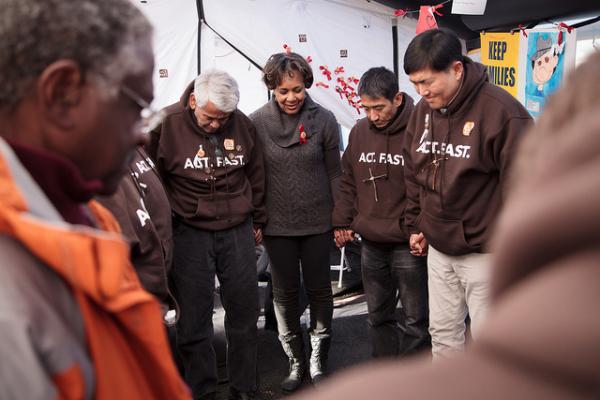There’s an unhealthy expectation within many faith communities that we’re always supposed to be joyful, as if being anything other than a smiling, peaceful, and jolly spiritual cheerleader is detrimental to Christianity.
“Being a good witness” is often the Christian way of saying, “act the part.” But while contentment and happiness is a spiritual virtue, it should never come at the expense of honesty, transparency, and truthfulness. We shouldn’t pretend to be happy and use the facade of joy as an evangelism tool.
God desires reconciliation and renewal, and this often means confronting broken relationships and dealing with sin within our lives. Asking for forgiveness, admitting addiction, confronting abuse, seeking justice, requesting help, and serving others often makes you the opposite of happy — and that’s OK.
On Sunday, with lots of turkey, stuffing and pie still in the fridge, I joined the #Fast4families movement, abstaining from food and drink for a day in order to pray for immigration reform. At first, I hesitated because it wasn’t necessarily my ideal time for fasting — besides being Thanksgiving weekend, I was about to enter the last two weeks of my academic semester, the most mentally demanding and sleep-depriving time of my year.
Quickly, however, I realized that all the worries I had going into the fast came from my white, privileged, experience of the world. Because of my privilege, I could believe in the illusion that immigration reform does not affect me.
The more I thought about this, the more I concluded that my reasons for not fasting were pointing to the ugliness of my own privilege and participation in racism, for if we do not actively challenge racism, we affirm it. This is what Jesus was getting at in Matthew 12:30, when he said, “Whoever is not with me is against me, and whoever does not gather with me scatters.” Jesus does not call us to merely advocate, but asks us invest our whole lives.
My hesitancy to fast was also a reflection of Western spirituality, which privileges the mind over the body and knowledge over action. Before I knew about the fast, my inclination was to spend my day’s energy on academic work, ignoring the body I live in, as well as those bodies that suffer far more than I ever would under an oppressive immigration system.
British novelist and essayist Francis Spufford’s spirited defense of the Christian religion is in some ways like eavesdropping on a missionary conversation with the pagans of antiquity.
Unapologetic: Why, Despite Everything, Christianity Can Still Make Surprising Emotional Sense — is the latest attempt at an ancient literary form, the Christian apology, and it makes its appearance in the United States more than a year after it was published in England.
Spufford’s defense of Christianity is aimed primarily at what he calls “godless Europeans,” the post-Enlightenment elites who tend to regard religion with bemusement as a silly fairy tale, if not with open hostility as a dangerous superstition.
How do you get kids to read one of the world’s oldest books? Ask Sally Lloyd-Jones, whose The Jesus Storybook Bible recently passed the critical mark of one million copies sold.
The British ex-pat and now proud New Yorker has never married or had children of her own, yet aims to retell the Bible to something that comes alive for young people.
One of her editors told her once that there are two types of children’s books authors: the ones who are around children, and the ones who are children inside.
“It kind of freed me, because I think I know I’m that second one,” she said. “And I can still write from that place, because my childhood is so vivid.”
The Christian cross has become little more than a piece of jewelry worn around the necks of celebrities, said Archbishop of Canterbury Justin Welby.
In the foreword to a new book about Christianity, the head of the world’s 85 million Anglicans presents the symbol of Roman torture upon which Jesus died as “the moment of deepest encounter with radical change.”
And he regrets that after 2000 years, the cross has become trivialized.
I always had very mixed feelings about Christmas as a kid. My dad — not a religious guy — went all out for this holiday, in the typical secular ways. He bought so many presents that it would end up being hard to make our way through the dining room, where we put the tree. We’d spend at least two weekends in November hanging lights and other swag outside, and the house resonated with Bing Crosby, Dean Marin and John Denver, all wishing us merry Christmas, over and over again.
I came to hate decorating the house. All of that time spent on the roof could have been much better used playing with my friends and, of course, I never hung the lights correctly. I’d flop them along the wrong side of the roofline, only to be sent back to make it right. And suffice it to say that, although I love the Rat Pack singers in particular, hearing any carol more than 43 times in the course of three weeks can sour even the most ardent fans.
Then there was the matter of the gifts. As I said, the piles of boxes were fairly obscene, which actually proved an embarrassment if we had other family visiting for Christmas. I was not a fan of being the center of attention, and opening my remaining presents while jealous cousins looked on made me just want to get it over and done with.
Next to biblical nativity stories, How the Grinch Stole Christmas by Dr. Seuss is one of my favorite seasonal tales. We read it as a family every Christmas Eve.
While we typically view this vintage Dr. Seuss yarn as a reminder that there is more to Christmas than its trappings, it offers something unexpected too. It shares an example of restorative justice at work.
A predominant message of this holiday season seems to be both loud and clear: Our value as human beings is often dictated by our capacity to consume.
While the average North American consumes approximately twice as much as 50 years ago, we are significantly less satisfied with the quality of our lives, which is — of course — contrary to the mass “this stuff will make you happy” messages we receive on countless occasions each day. Nevertheless, we continue to embrace a culture of consumerism, for we consume at staggering rates, not only in an attempt to make right our perceived wrongs, but also because we are led to believe that such devotion contributes to the wellbeing of society. As Victor Lebow states, “Our enormously productive economy ... demands that we make consumption our way of life, that we convert the buying and use of goods into rituals, that we seek our spiritual satisfaction, our ego satisfaction, in consumption ... we need things consumed, burned up, replaced and discarded at an ever-accelerating rate.” According to the most vocalized narratives that affect contemporary life, to be a human of significant value in North America — especially during the month of December — is to be a committed and consistent consumer, even if it leads to our personal and public self-destruction.
I love talking. According to my mother, I started making babbling noises at three weeks old and haven’t really stopped since. I love words and I love to use them — particularly in writing, tweeting, or delivering a well-timed rejoinder or witty remark.
But it’s shockingly easy to go from a pithy pun to a snarky statement — and I’ll admit that I end up cutting people down far too often.
I used to not care about this so much. Growing up in the church — particularly as the daughter of two pastors — the constant earnestness and cheesy Christian culture was so ripe for commentary. As a 9-year-old, I refused to attend “Superchurch,” our program for children because I thought it was too lame and when it came to stuff like Psalty and Charity Church Mouse, I just can’t even finish this sentence without writing something sarcastic.
Over time, one of the biggest obstacles toward embracing Christ was that I just didn’t want to be a Christian. I couldn’t see the appeal for a variety of reasons, but in particular, it seemed to involve a lot of smiling, emotional vulnerability, and being sweet — all of which made me uncomfortable. The irony here is that I’m actually a very smiley, emotionally vulnerable, and maybe not sweet, but warm person, so yes, Dr. Freud, snark is a defense mechanism.








